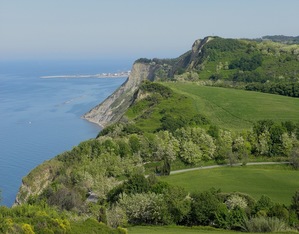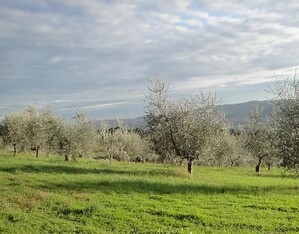An outstanding Renaissance villa with annexed garden composed of two distinct buildings. The earliest and most austere part was extended by the Duchess Leonora Gonzaga as a gift to her spouse Francesco Maria Della Rovere, Duke of Urbino, for him to come here and rest after his military endeavours.
The villa, surrounded by an untouched hilly agricultural and woodland landscape, is composed of two buildings. The first, quadrangular in shape with a tall tower, was built by Alessandro Sforza, Lord of Pesaro. Completed in 1469, it owes its name to a visit made by the Emperor Frederick lll. The second building called “Imperiale Nuova” and connected to the first by an aerial walkway, was built for the Dukes Della Rovere in the sixteenth century by the Urbino architect Girolamo Genga. This is a quadrangular structure that emerges from the hillside containing three internal terraces: the top two were intended as gardens, while the courtyard below was for court performances and ceremonies. Geometric boxwood flowerbeds recall the lavish sixteenth century plan, while a “wild” area occupies the upper section. A system of roofed terraces on the valley-facing side of the building afford an extensive view of the valley, with the river Foglia framed by rolling hills and the Apennines fading into the horizon. Over the years Villa Imperiale has been owned by various aristocratic families: the Medici, the Albani and, lastly, the Castelbarco Albani who carried out several restoration interventions during the last century.
Highlights

The frescoes
Inside the rooms of the old Sforza villa there is a series of frescoes by Francesco Menzocchi, Raffaellino del Colle, and Camillo Mantovano. In 1530 the Dossi brothers frescoed the magnificent “Camera delle cariatidi” with its painted pergola framing sweeping landscape views embellished by busts and plant décor.

Parco San Bartolo
The villa is located inside Parco San Bartolo, a protected regional park comprising hilly areas, agricultural land, and woodland delimited by an about 200 m cliff on the Adriatic coast, with a series of valleys and spurs interspersed with vertical rock exposures.

The estate
The centuries-old olive trees that surround Villa Imperiale speak to the bond this estate has enjoyed with nature for more than 500 years. On the land on Colle San Bartolo, the Castelbarco Albani estate cultivates organic olive trees producing extra virgin olive oil of superior quality.
 Villa Imperiale
Contacts
Villa Imperiale
Contacts
Contacts
Other contacts::Cooperative Isairon for booking visits
- phone +39 338.2629372
- mail: [email protected]
Address
Strada dei Cipressi, 63
61121, Pesaro (PU)
 Villa Imperiale
Opening times and prices
Villa Imperiale
Opening times and prices
Opening hours
Villa Imperiale is open for visits only in the summer months, from 6 June to 3 October 2020
For the 2020 season, visits are planned:
- every Wednesday from 3.30 p.m. to 6.30 p.m.
- every Saturday from 10.00 a.m. to 1.00 p.m.
The visits are organized by the
Isairon cooperative
with compulsory reservation
Pricing
Tour route 2020
- The cost of the visit is € 10 per person
For the 2020 season, for the safety of visitors and guides, there will be a single tour in small groups that will privilege the open spaces, courtyards, terraces and gardens with staggered access to the apartments in the Della Rovere wing of Duchess Leonora Gonzaga. For security reasons, the frescoed rooms will remain closed.
In addition, given the anniversary of the fifth centenary of the death of Raphael, the tour will place particular emphasis on the relationship between Raphael, Genga and Della Rovere, entitled “Villa Imperiale | Da Raffaello a Girolamo Genga: la Maniera moderna tra arte e natura”.
Visits are by appointment only at the
Isairon cooperative
.
 Villa Imperiale
How to get there
Villa Imperiale
How to get there
Address
Strada dei Cipressi, 63
61121, Pesaro (PU)
Latitude: 43.92124
Longitude: 12.879151
How to arrive by road
From the motorway take the PESARO-URBINO exit, then the SS 16 towards Pesaro until Via Lucio Accio. Then follow the signs to the villa.
 Villa Imperiale
Services/Accessibility
Villa Imperiale
Services/Accessibility
Services
Guided tours for individuals and groups
The visits, by reservation only, are organized by the Isairon cooperative . Visitors will be accompanied by a tour guide for the duration of the tour.
 Villa Imperiale
Private events
Villa Imperiale
Private events
Villa Imperiale allows its guests to organize many private events, business meetings, conferences, gala dinners and weddings.
The Villa also offers numerous spaces and scenarios for photo shoots.
For further information please contact the following email address: [email protected]
 Villa Imperiale
Itineraries
Villa Imperiale
Itineraries
You could find the garden in these itineraries
 Favorite saving result
Favorite saving result
 Warning!
Warning!
You've have to sign up or sign in to add this element to your favorites.
